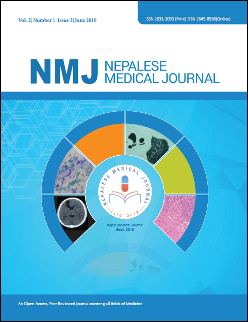A Comparative Study of Clinical Profile, Metabolic Parameters and Outcome of Patient Among Subtypes of Alcohol Dependence Syndrome in Tertiary Level Hospital of Kathmandu Valley
DOI:
https://doi.org/10.3126/nmj.v2i1.24104Keywords:
Alcohol, Alcohol dependence, Alcohol withdrawal, Delerium TremensAbstract
Introduction: Alcohol is a legally allowed substance used for recreation associated with harmful health consequences both on using it and trying to quit (withdrawal phase). Many patients of alcohol dependence are brought to hospital or emergency in the withdrawal phase and require intensive treatment. It’s associated with life threatening conditions and associated with occurrences of seizures and confusion. Based on severity, it can be subtyped and managed differently. The study tries to compare and contrast the subtypes of withdrawal phases of alcohol in terms of clinical, outcome and metabolic parameters
Materials and Methods: This is a cross-sectional study of all patients diagnosed as alcohol dependence syndrome admitted over a period of two years (June 2016 to June 2018) in the psychiatric ward of KIST medical college and teaching hospital. It’s divided into two phases namely complicated and uncomplicated phase and clinical, outcome and metabolic parameters are compared and contrasted.
Results: Out of 166 patients studied, 54% of the patients were diagnosed with complicated withdrawal features. Significant changes were noticed in increase duration of stay, low level of platelets and potassium and SGPT levels in a complicated group compare to the uncomplicated group. Mortality was not seen in any of the group
Conclusions: Patients can be treated in-ward setting successfully and if the diagnosis is of complicated withdrawal then metabolic parameters like potassium, platelet level has to be taken into consideration. Complicated withdrawal features increase the chance of morbidity and increase the duration of stay.
Downloads
Downloads
Published
How to Cite
Issue
Section
License
This license enables reusers to distribute, remix, adapt, and build upon the material in any medium or format, so long as attribution is given to the creator. The license allows for commercial use.
Copyright on any article published by Nepalese Medical Journal is retained by the author(s).
Authors grant Nepalese Medical Journal a license to publish the article and identify itself as the original publisher.
Authors also grant any third party the right to use the article freely as long as its integrity is maintained and its original authors, citation details and publisher are identified.




